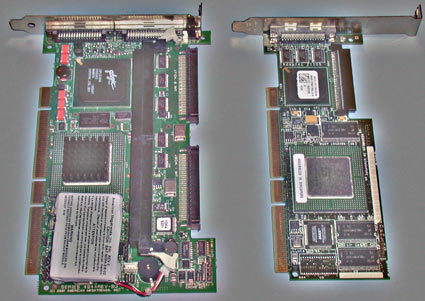Premium Controllers Under Scrutiny: Ultra160 RAID Adapters from Adaptec and LSI
Professional RAID: Only With SCSI!
Only a few years ago, the term "RAID" would have been new to most users. Today, by contrast, this term is a byword for hard drive performance and data security. They can all do it to a certain extent, but only a few really do it right.
RAID stands for "Redundant Array Of Independent Drives," and originally described a system of several interconnected hard drives. The aim of interconnecting two or more drives is to achieve selective redundant data management (multiple storage), in order to facilitate lag-free operation in the event of drive failure.
Since this is a traditional SCSI domain, many favorable features like command queuing, high bus bandwidth, easy expansion, hot plugging, etc. are usually not available to IDE devices. While most IDE RAID controllers support only RAID modes 0, 1 and the combination of both (10), there are only a few that support the advanced modes (3, 5). In contrast, there are hardly any low-cost SCSI RAID adapters. Instead, most devices come with multiple features and support for complex RAID modes.
The most simple way to implement a RAID array is to use two drives that hold identical data stocks (RAID 1, also referred to as "mirroring"). RAID 0 is all the rage at the moment, though in fact, it is not, strictly speaking, a RAID mode, as data security is sacrificed in favor of maximum performance (striping: distributed data storage acccording to the zipper principle). It is this variation in particular that has become the most widespread, as the majority of all additional IDE controllers installed on motherboards use this mode. But beware! A RAID 0 will become physically destroyed, should one of the drives in the drive array fail. Other RAID modes (3, 5) attempt to enable both performance and data security by storing parity information.
Get Tom's Hardware's best news and in-depth reviews, straight to your inbox.
Current page: Professional RAID: Only With SCSI!
Next Page RAID 5 And IDE? No, Thank You!
Patrick Schmid was the editor-in-chief for Tom's Hardware from 2005 to 2006. He wrote numerous articles on a wide range of hardware topics, including storage, CPUs, and system builds.
